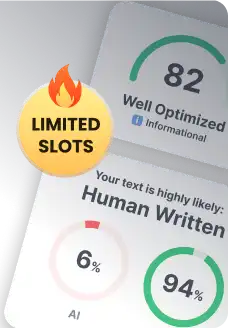A friend recently lamented about his website’s low traffic. After a glance, the culprit was clear: his meta titles were dull, lengthy, and failed to spark any interest. This common mistake can easily be avoided. In this guide, we’ll explore the optimal meta title length and provide you with the tools to craft compelling titles that will attract users and boost your search engine rankings.
Key Takeaways
- Keep meta titles concise, ideally between 50-60 characters, to ensure they display well in search results and are fully visible to users.
- Crafting effective meta titles is crucial for SEO as they significantly impact click-through rates and search engine rankings.
- Use relevant keywords naturally within your meta titles to enhance their visibility and relevance in search queries.
- Avoid keyword stuffing and overly long titles, as Google may rewrite them or ignore them, affecting your site’s performance.
- Understand that Google may generate its title links based on page content, so ensure your page content aligns with the meta title.
- Regularly review and update your meta titles to reflect current content and SEO practices for optimal results.
What is a Meta Title?
A meta title, or title tag, is an HTML element that specifies the title of a webpage. It serves as the headline, appearing prominently on search engine results pages (SERPs) and browser tabs. This tiny piece of code conveys the main topic of your webpage to both users and search engines, acting as a first impression that can either attract or deter visitors.
Meta titles succinctly summarize your page’s content. When crafted effectively, they entice clicks by highlighting the core message. For example, a well-structured meta title for a blog post about healthy recipes could be: “10 Easy Healthy Recipes for Quick Weeknight Dinners.” This tells users what to expect while appealing to those seeking quick meal solutions.
Role in Search Engine Optimization
Meta titles are vital for Search Engine Optimization (SEO). They are not mere placeholders; they enhance your page’s visibility. Search engines rely on these titles to understand your page’s context, which influences indexing and ranking.
A compelling meta title with relevant keywords can significantly boost your SEO efforts. Search engines often bold keywords in meta titles on SERPs when they match user queries, increasing the likelihood of users clicking on your link.
However, there is an optimal length. Typically, search engines display up to 60 characters of a meta title before truncating it. Therefore, each word must count. Crafting concise, informative titles is crucial for maximizing their impact.
Difference from Meta Descriptions
Although meta titles and meta descriptions both appear in SERPs, they serve different purposes. The meta title is like a book’s title—brief and direct—while the meta description functions like the book’s blurb, providing more detail about the content.
Meta descriptions offer additional context that complements the meta title, helping users decide whether to click. Unlike meta titles, they do not directly affect SEO rankings, but they can influence click-through rates by providing engaging summaries.
Optimal Length for Meta Titles
1. Ideal Character Count
Aim for a character count between 50 and 60 to prevent truncation in search results. A cut-off title can lead to misunderstandings about your page’s content and deter potential visitors. Clarity and relevance are essential within this limit; your title should accurately reflect the content while enticing users to click.
2. Recommended Pixel Width
In addition to character count, consider pixel width. Google typically displays up to 600 pixels on desktops. Different letters and symbols occupy varying amounts of space—e.g., “W” takes up more space than “i.”
Therefore, a title with fewer characters could still exceed the pixel limit if it contains wider letters. Monitoring pixel width ensures your entire message is conveyed without unwanted truncation.
3. Display Variations on Devices
Meta title displays vary across devices. While desktops accommodate up to 600 pixels, mobile screens have stricter limitations. A title that fits well on a desktop may be cut off on a smartphone.
It’s crucial to test your titles across devices to ensure consistency and readability. Consider how your audience will access the content to tailor your titles for optimal visibility on any platform.
Importance of Meta Titles in SEO
Influence on SERP Rankings
Meta titles significantly affect your position on search engine results pages (SERPs). They are a crucial ranking factor that influences search engine visibility. Search engines like Google rely on these titles to understand your page’s content. An effective SEO title tag communicates the essence of your content, enabling accurate indexing and ranking. Higher rankings lead to increased visibility and traffic, making precise HTML title tags essential.
Want to try SurgeGraph for free?

Generate 20 documents

SEO tools (Auto Optimizer, Internal Linking, and more)

No credit card required
Impact on Click-Through Rates
Meta titles also have a profound impact on click-through rates (CTR). They serve as your page’s first impression, and an enticing, relevant title captures user attention among numerous options. Users are more likely to click a link if the title aligns with their search intent.
For example, including relevant keywords in your title can significantly boost CTR. This focus is not only about attracting clicks but also about driving qualified traffic to your site. Ensure your titles are clear and relevant to maximize their effectiveness.
Significance for Social Media Sharing
Meta titles extend beyond search engines; they are vital for social media sharing. When users share your page on platforms like Facebook or Twitter, the meta title often serves as the headline. A compelling title can increase the likelihood of shares and engagement, amplifying your reach.
Ultimately, a well-crafted meta title bridges your content and potential audiences across various channels. Consider: Is my title share-worthy?
Reasons Google Might Ignore Meta Titles
Common Mistakes to Avoid
Meta titles are essential for search engine optimization (SEO), but common mistakes can lead Google to overlook them. One frequent error is creating titles that are irrelevant or misleading. If your title fails to accurately reflect your page’s content, Google may modify it, prioritizing user experience to ensure accurate search results.
Another pitfall is crafting overly complex titles. When a title attempts to include too much information, it can confuse both users and search engines. For example, using multiple long-tail keywords separated by commas can make the title convoluted. Google’s algorithms favor concise and clear titles that effectively convey the page’s topic.
Additionally, excessive use of separators like brackets and pipes can prompt alterations. While these elements can structure information, overuse can make a title look cluttered and unappealing. Balance is key; ensure your meta title remains readable and straightforward.
Criteria Google Uses for Rewriting
Google uses specific criteria to decide when to rewrite meta titles. First, relevance is crucial. If a title doesn’t align with the main content, Google may adjust it to better fit user queries, ensuring users find exactly what they seek.
Clarity is another criterion. Titles lacking clarity or containing jargon unfamiliar to average users are more likely to be rewritten. Google’s goal is to ensure that every search result is easily understandable.
Brevity also plays a role; titles exceeding optimal length limits—typically 50 to 60 characters—risk being truncated or modified. Keeping titles within this range helps maintain visibility and effectiveness.
Ensuring Relevance and Accuracy
To prevent Google from ignoring or altering your meta titles, focus on relevance and accuracy. Start by conducting thorough keyword research to identify terms your target audience frequently uses. Incorporate these keywords naturally into your title.
Next, ensure your title accurately reflects your page’s content. Ask yourself whether the title provides an honest preview of the content. If not, adjustments are necessary.
Finally, prioritize simplicity in your titles. Avoid unnecessary fluff and focus on essential information. A straightforward, descriptive title will satisfy Google’s criteria and attract more clicks from users.
How Google Generates Title Links
Algorithms Behind Title Creation
Google’s algorithms are highly sophisticated in generating title links. They analyze the original title of a webpage, assessing its relevance and accuracy based on the page content and user queries. If the original title is inadequate, Google intervenes.
In this case, Google may rewrite the title using content from headings or other prominent text on the page. This approach ensures the title aligns more closely with user search intent. The goal is to provide relevant, concise, and informative titles that accurately reflect the content users are about to explore.
Factors Influencing Title Display
Several factors influence Google’s choice of title display. First, it considers the original title provided by the website, but it also examines whether that title accurately represents the page content. If it doesn’t, Google may select an alternative.
Want to try SurgeGraph for free?

Generate 20 documents

SEO tools (Auto Optimizer, Internal Linking, and more)

No credit card required
User queries also play a crucial role. If there’s a mismatch between the query and your title, Google may adjust it to better align with user expectations.
Additionally, Google may incorporate headings or other significant text from your page if they offer a clearer representation of your content. This matters because a well-crafted title can significantly impact click-through rates, determining whether a link is clicked or overlooked.
Strategies for Crafting Effective Meta Titles
1. Prioritize Essential Keywords
Start by prioritizing essential keywords that align with user searches. These keywords are crucial for effective meta titles. Incorporating primary keywords naturally increases the chances of your page appearing in relevant search results. Keep titles concise and focused on the main topic to avoid overwhelming potential visitors.
2. Avoid Keyword Stuffing
Keyword stuffing is detrimental to SEO. Although it may be tempting to include as many keywords as possible, excessive use can lead to penalties from search engines. Instead, create a meaningful meta title that flows naturally. Ask yourself if the title sounds appealing; if it feels forced or awkward, revise it.
3. Maintain Uniqueness Across Pages
Each page on your website should have a unique meta title. This differentiation is essential because each page targets different keywords and topics. Duplicate meta titles can confuse both search engines and users. Give each page a distinct identity by crafting titles that accurately reflect its content.
4. Balance User Appeal and SEO
Strive to balance user appeal with SEO requirements. An effective title should attract clicks while satisfying search engine algorithms. Consider what prompts you to click on a link—curiosity, relevance, or urgency—and incorporate these elements without sacrificing keyword placement. Use hyphens for separation to maintain clarity and impact.
5. Incorporate Brand Elements
While prioritizing essential information is crucial, including brand elements can enhance trust and familiarity when done appropriately. A useful meta title with a recognizable brand name can build credibility. However, avoid unnecessary branding unless it adds contextual value. Limit titles to two segments for clarity and impact, as too much information can overwhelm potential visitors.
Frequently Asked Questions
How long is the meta title in Google?
Meta titles should ideally be between 50-60 characters. This ensures they display fully on search results, enhancing visibility and click-through rates.
What does Google do if your title is too long?
If a meta title is too long, Google truncates it. This can lead to incomplete information being shown, potentially reducing click-through rates.
Are long titles bad for SEO?
Yes, excessively long titles can harm SEO. They risk being cut off in search results, which may confuse users and lower engagement.
Why might Google ignore your meta titles?
Google may ignore meta titles if they’re irrelevant or misleading. It might generate its own based on page content for better accuracy.
How does Google generate title links?
Google uses page content and user queries to create relevant title links. This ensures users receive accurate and helpful information in search results.





